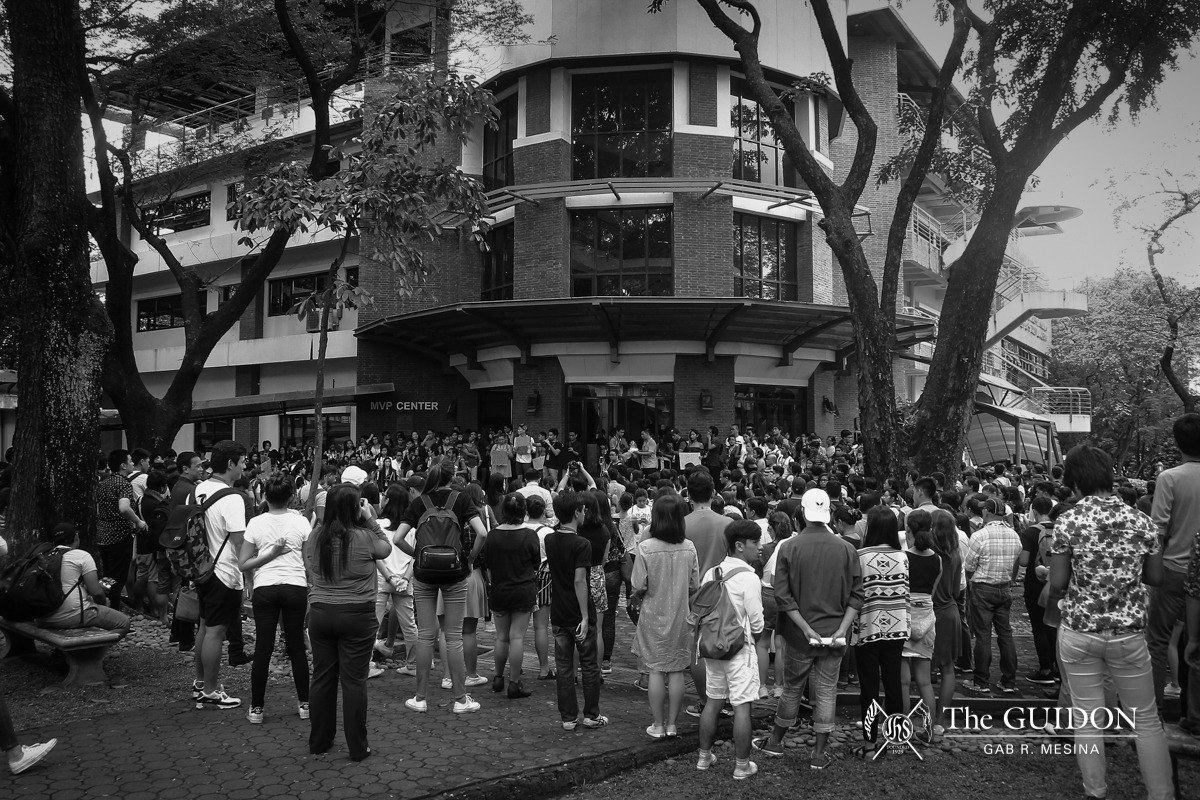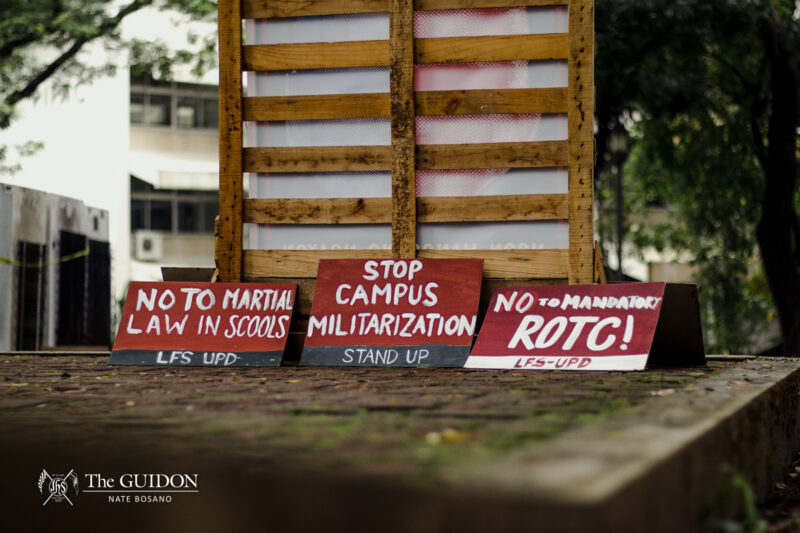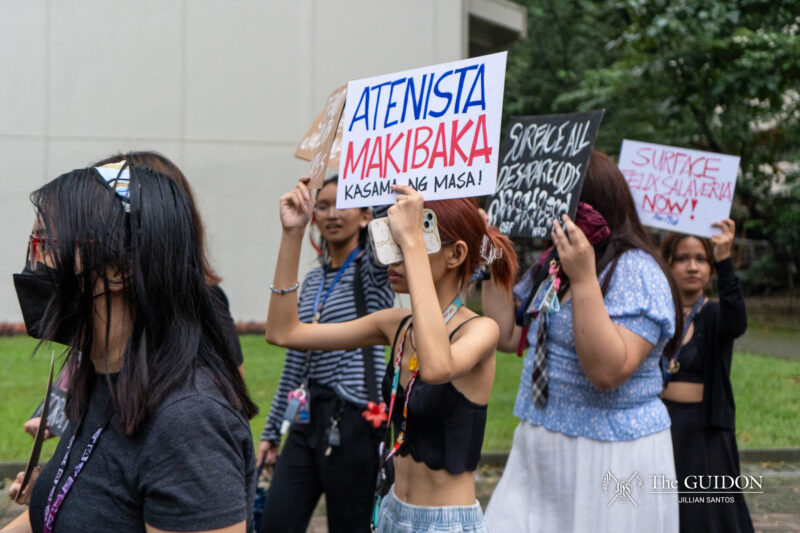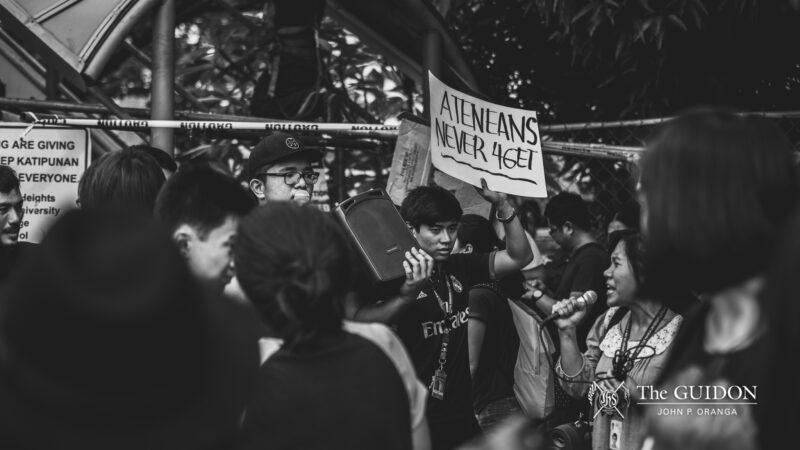No other period in Philippine history has such a markedly transitional character as the last five years that saw the growth and maturation of activism, where expansive historic strides have been effected in the pervading climate of dissent. The growing sentiment, particularly on the part of the students, is one of disaffinity, and consequently the clamor for radical freedom.
Activism is a reality that must necessarily obtrude upon the consciousness of whoever purports to be a realist. Increased politicalization compounded by the contrasting pressure of transportation and mass media are intensifying social awareness among and slowly integrating the broad masses. Under politicalization the masses become more aware of their oppressive yoke and their class distinction. Through media in the form of propaganda, they sense a kinship tie with the dispossessed masses of other regions to the effect of creating a solidarity. Activism signifies first of all the “negation of the negation.” A dialectical term, it refers to the rooting out of senescent or outworn values and institutions. These values and institutions are no longer responsive to the present needs. They therefore deny the individual his presence. These negating elements must be in turn be denied, obliterated, negated. As a consequence, this activism positively stresses a recognized value and institution to replace those which it destroys. Activism no longer pertains to isolated and sporadic outbursts directed against isolated issues; the “ism” testifies to an organized manpower brought to bear upon the Establishment itself which it considers an exploitative order. Speaking of the Sorbonne strike in France, Sartre remarked, “The students have begun to push back the limits of the possible.”
To be relevant, a university must take its stand in relation to activism.
What is relevance
Relevance consists initially in being realistic. Consider for example a prisoner who is condemned to die at daybreak. He would not be realistic if, being in such situation, he dwells on green pastures, lush trees and the like that were once part of his life as a free man. On the contrary, he would be an escapist. And he would successfully escape the frightening reality of his situation only until such time as daybreak comes. Forcibly, he must face reality. It is merely a question of time. On the other hand, he would be realistic if he fully recognized his situation and either accepted it as his fate or attempted to break free.
It is the business of a prisoner to escape–not by denying his situation, but altering it.
Activism offers a means of altering the situation.
The story again is told of a prisoner who was hypnotized into believing he was free. He felt happy in his imagined freedom. One will object; why awaken him from his delusion when this makes him happy? One will even be tempted to go further and observe: Never open a man’s eyes unless you have something pleasant for him to see.
Why indeed unbridle the prisoner of his delusion? Because as in our earlier example of the condemned prisoner, freedom does not consist in denying an existential fact. Our second prisoner cannot forever exist in his state of delusion. The fact of the cell and his physical needs will necessarily force upon him the reality of his imprisonment. Again, it is a matter of time.
On the other hand, it is sheer torture to awaken the prisoner to his condition unless one can promise him freedom. Activism promises freedom and a better society and the means to this end. It is not easy but, as a collective effort, it is inevitable. Activism seeks to destroy our present outworn values and institutions–U.S. imperialism, feudalism,, bureaucrat capitalism (figuratively the prison bars)–which have hitherto confined us in the most obnoxious form of imprisonment and slavery.
Relevance consists of two elements: awareness of the situation and response to the situation. To be realistic, that is, to recognize fully our prison conditions is only one part of the problem. As we have mentioned earlier, the prisoner can either accept it as his fate or he can rebel against the inquiry and seek to escape.
In the university, students are taught to escape by denying the situation and not by altering it. Thus, for example, despite critical social problems in the Philippines and the phenomenon of activism, the typical Atenean sits back in complacency, and, in abstraction, contents himself with pitying the plight of an all-encompassing humanity.
Relevance is a matter of time and priority. One might content that our present liberal arts is “relevant” because it enriches the human personality. Or perhaps, one might say that it teaches the individual to think for himself by offering courses designed to polish the critical faculty. The answer to the first objection is that it is all inclusive. I can study the most obscure subject and content that it enriches my personality and therefore it is relevant to me. But when such preoccupation bars me from responding to the pressing problems of the moment, can I still speak of relevance? Again, the belief that the liberal arts course hones the critical faculty is to hold the Kantian position that the mind functions irrespective of content, The average Atenean harbors the belief that after his college, he is developed in such a way he can respond to any given situation. Given any content the mind can digest this for one’s mental nutrition. This is in direct opposition to the Marxist belief that social being determines consciousness rather than consciousness determining being. It is in practice and lived experience, in other words, that consciousness and the human personality evolve. Consequently, the need is to radically overhaul the present system of education to such a degree that it resembles the D.G. (discussion group) system that has become part of the activist way of life. Nor is this completed until the individual supplements his education by actually working with the masses and society under his limitation and power as a student.
The demands of our liberal education are broad-mindedness, love of humanity (“I love humanity, it’s people I can’t stand”), and objectivity. This implies attitudes of calmness, reasonableness, and spectatorviewing. On the contrary, an education that admits a social dimension requires attitudes of involvement and subjectivity.
To be irrelevant is to lack a temporal perspective. It is to live in the glories of a past (that is for the most part, borrowed from another civilization) rather than recognizing the exigencies of the present. It is also the attitude of lamenting the present rather than seeking to alter it to a desired goal. To be irrelevant is also to lack a sense of priority, or to possess a hierarchy of values that is in direct opposition to that of the common good. Priority is the sense of exigency. Social conditions in the Philippines have become intolerable. Priority demands that our education takes this into consideration since they are part of our existential fact of being Filipinos living in the year 1971. Recognition and response to the situation constitute our identity as students and Filipinos.
Relevance is doing the right thing at the right time
The act of rebellion
In the book, The Rebel, Camus distinguishes rebellion from resentment. Resentment has been applied for example to Christianity by Nietzsche to describe it as a slave morality. Resentment is essentially a reaction. It implies a negative act without necessarily recognizing a positive value. It is simply an act of destruction generally occasioned by envy. Whatever positive value springs from it is merely incidental. On the contrary, a noble sentiment springs from the affirmation of a positive value. Reaction to conflicting elements is merely incidental. Camus believes that rebellion is not resentment. It springs from a positive value. The rebel, for example, recognizes the value of freedom as a necessary condition to human dignity. The rebel, first and foremost, desires for his goal the affirmation of his humanity. He realizes that he would rather die on his feet than live on his knees.
The recognition of value is a process. The slave is, first of all, conscious of the fact that he wants to be free. It is a particular desired good. Next, he becomes conscious of the fact that similarly, other men must want to be free. What is desired becomes desirable, and what is particular becomes general. What is a fact becomes a value.
Paradoxically enough, the aim of rebellion is to establish not chaos, but order. The rebel seeks to establish a value, e.g. freedom, without which there would indeed be chaos. He moves because he is aware that existing conditions are chaotic and lacking in the exercise of values. The rebel then struggles for order.
Activism and the academe
Activism is rebellion. Activism recognized that the present condition of the Philippines is one of chaos under the rule of the three Furies: imperialism, feudalism, and bureaucrat capitalism. Activism has penetrated most universities. Despite minor differences, the various legitimate activist groups are agreed on a national democratic line and the need to radically overhaul a system looked upon as perpetrating social iniquities. Social realities have created the pressures of the modern world and are fracturing the hitherto closed confines of the academe. The effects are explosion and implosion. On the one hand, education is spilling out into the streets, (“Don’t let your studies get in the way of your education.”). Demonstrations, rallies, sit-ins,teach-ins; no longer are students content to function in the vacuity of disembodied ideas, concepts of the universal, constant truths applicable to any given time and place. It is the conception of man as possessing a constant nature unaltered by environmental changes. On the contrary, students, if only intuitively apprehend the exigency of steeping themselves in the finite, temporal, concrete realities surrounding them. The modern world has heightened the dichotomy between objectivity and involvement. Students have chosen involvement.
Implosion has similarly occurred. As students carry their education to the streets, they retrieve pedestrian information for academic consumption. Where before the universities exalted the Great Ideas, they are now prevailed upon to consider the palpable realities of the here and now, prosaic though they may appear to our finely-honed aesthetic sensibilities. Students today are awakening to social, economic, and cultural inequities. They opt for an experiential form of knowledge, one that enables them to feel the pulse of these changing times, and one that situates them within the Filipino context. The demands of our liberal education are broad-mindedness, love of humanity (“I love humanity, it’s people I can’t stand”), and objectivity. This implies attitudes of calmness, reasonableness, and spectatorviewing. On the contrary, an education that admits a social dimension requires attitudes of involvement and subjectivity. Academic dissent in its most elementary form embarks on a quest for identity.
Academic dissent seeks to express that an old university tradition is dead. Thus far, the discipline of the liberal arts has conspired to impart upon an elite the key to understanding human existence. Our universities have existed, and still do, in the void of scholasticism that properly belongs to the middle ages. During the period of scholasticism, scholars spent their energies on metaphysical problems. Scholasticism particularly fed on the philosophy of Thomas Aquinas, an intellectual religious philosophy based on logic and revelation. The study of Latin was engaged in industriously. Evidently, as existentialism or Zen Buddhism would show by comparison, Thomism was simply an exercise in mental acrobatics. Scholars were expected to master their grammar and rhetoric, and to learn the art of discourse. How does this differ from our liberal arts course in universities? Our students are expected to master their question and answer lessons, and to learn to elaborate on the eternal problems of suffering, death, God, and the like–in abstraction. When one abstracts, one escapes to the sanctuary of the eternal principles – to an unmoving world, free from the trepidations of the finite, concrete world. Liberal arts are intended to enrich the human personality. How bloodless this is compared to the raw, opaque, concrete, and inexhaustible reality of life! Academic dissent, inadvertently or not, denounces the “humanistic” disciplines that infiltrate our curriculum. It proposes dispensing with the elements pernicious to the Filipinization for a more relevant one that is responsive to our existential and social needs. Filipinization does not entail a wholesale dismissal of Western culture, or cultures other than our own. It means, however, the intensive studies of the indigenous peculiarities of our own culture. It has been suggested that Filipinization is an insidious enterprise by activist teachers and students alike, seeking to cut the Philippines off from the mainstream of civilization. What civilization? Freud himself expressed his disaffinity with the Western civilization in his book Civilization and Its Discontents. Carl Jung, another noted psychoanalyst, has attempted to bring oriental ideas and attitudes to the West and recommends James Joyce’s Ulysses, which he considers very Oriental, as a much needed antidote to Western positivism. Civilization for whom? For an elite that would alienate itself in thought, attitude, and feeling from its own culture and people. The Philippines has a culture – in its raw form as it is spoken, thought, and acted by the masses. Ultimately, we cannot speak of an assimilation of Western ideas yet. Assimilation or acculturization implies the compounding of one culture with another. We have, so far, neglected our own pulsating culture for another. There has been no assimilation; clearly, there has only been an unabashed transplantation of Western elements on Filipino soil. There is a need then to stress first and foremost, a counter-culture that is more indigenous to the Filipino sensibility and national experience. Hitherto, our universities have been soaring over metaphysical heights. The old world has fallen. Academic dissent testifies to this.
The Philippines in the twentieth century
The twentieth century is a paradox. Life in it is at once exciting and painful. On the one hand, we may speak of the twentieth century as an explosion occurring on all spheres. Economically, our century has embarked upon a massive industrialization that reduces the Industrial Revolution by comparison, to insignificance. Never before has the need for increased specialization and division of labor has been more felt than now. The initial stages of capitalism, during the seventeenth and eighteenth centuries, favored the policy of free enterprise. Small businesses were put up with competition, regulated by a strict moral code under the auspices of a Christian community. The expansion of businesses, however, along with the deterioration of Christendom and the reformation, brought capitalism to an exploitative phase. By the nineteenth century, with the discovery of steam, the Industrial Revolution took its full swing. Machinery replaced human labor, thus reducing its cost. The policy of maximum profit for minimum investment was liberally adopted. Without the ethico-moral code that regulated competition during the preceding centuries, factories now engaged in cut-throat competition at the expense of the common laborers. Women and children were employed at hard labor with very low pay. Factory owners no longer controlled the economic system, they were controlled by it. They were increasingly forced to expand and exploit to avert annihilation and bankruptcy. By the twentieth century, capitalism metamorphosed into business empires with its giant corporations. It was a phenomenon unprecedented in economic history. Factory ownership became corporate ownership. No one individual owned a company, but a group of individuals. Generally, the major stockholders comprise the board of directors and they determine the policy of the company. The investor has no idea what his business is all about. He simply invests and receives his profits.Ownership and management have been separated. Managers, along with the workers, are hired. In the United States, corporations have grown to such proportions, with the aid of advanced technology, that no individual knows the scope of the business. Data is processed by computers. The need for specialization is evident in the organization of teams to perform particular functions. How innocent capitalism was at its earlier stages!
The spirit behind seventeenth and eighteenth century capitalism can be appreciated only in relation to the climate of the Reformation and the attitudes it (particularly the Calvinist sect) fostered. After the overthrow of Christendom, along with its rituals, institutions, and traditions, Protestantism encountered God, face-to-face without a mediator. Man attempted to justify his existence by industry. In the protestant climate of the seventeenth and eighteenth centuries, industry had a primarily religious connotation. The successful businessman was justly rewarded by God for his industry. The history of capitalism records man’s fall from his exalted position as the controller of economic forces to the object of control. He has become an economic unit manipulated by technology. It has been observed that Americans today are no longer in danger of becoming slaves but of becoming robots. The Philippines has not yet embarked upon these final stages of capitalism. It is still within a physically exploitative phase. And yet the bourgeoisie has already steadily acquired the values and attitudes of the technopolis. In modern capitalism, everything revolves around the market. Going to college is advantageous since it increases our marketable price. Everything is practically being geared towards the increase of one’s marketability. In the field of human emotions, in love, Erich Fromm observes (The Act of Loving): “Two persons thus fall in love when they feel they have found the best object available in the market, considering the limitations of their own exchange values… In a culture in which the marketing orientation prevails, and in which material success is the outstanding value, there is little reason to be surprised that human love relations follow the same pattern of exchange which governs the commodity and labor market.”
We have similarly acquired the attitude of indiscriminate consumption. We consume everything from books, movies, magazines, food, medicine, and etc. all in neat packageable items. Even sex is to be had in packages–in bomba comics and movies. The attitude has become one of passivity on the consumptive level. Increasingly, we are being conditioned to react, never to act. Here, we can glimpse the enormous power at the disposal of those who control mass media. They can very easily condition a whole mass of people to submissive passivity. Activism chooses to act, rather than to react.
Explosion has likewise occurred in the sciences. The complexification of knowledge has given birth to various branches of study. Specialization again becomes paramount. Atomic scientists work in teams, each team versed only in its area of specialization. Chemistry, physics, and mathematics can no longer be studied in whole but in derivative branches. The grasp of the overall construct is slipping from human comprehension. The orientation is tending towards a know-how rather than a know-what.
Knowledge today is doubling logarithmically. Every year, radical advances are being made in all academic disciplines. The behavioral sciences are now branching out to encompass new findings. The increase of knowledge is accompanied by a rapidity of change. What is useful and relevant as a particular moment in history can no longer be for the next. Teachers can no longer teach what they have learned, but what they are learning. Radical changes are inevitable in the modern world. If only for purposes of survival.
The political, economic, cultural, and social structures of the modern world are altering by explosion. Nations are born overnight. Ideologies emerge and class wars rage as change is demanded to cope with the pace of the modern world. The contradictions within outworn institutions and systems become manifest with explosion. These institutions persist in viewing the problems of today with the visions of yesterday. Despite a rapidly altering environment, members of the past generation have remained conservative and defensive. This rear-view mentality, which sees to present old solutions to new problems, has bred stifling contradictions.
In the Philippines, contradictions within the system are obvious. The Philippines, thanks to imperialism, has remained feudal, medieval even, in all respects – social, cultural, and economic. Our parents still retain the apprehensiveness prevalent during war years. American bases still exist in the Philippines so as to supposedly protect it from the insidious Communists and their subversive allies. Meanwhile, our natural resources are being exploited and our universities are infiltrated by antediluvian doctrines, inapplicable even to Mahoma’s time. Our social structures still remain feudal in character with its landlord-tenant construct. With illiterate farmers under the paternalism of landlords and conservative students harboring humanist concepts, our country has hitherto been the victim of an exploitative few who are themselves being manipulated by their American protectors. The contradictions in our system have emerged from the altering patterns of the modern world, from the rapid change effected by explosion. The Philippines, so long as it is being controlled by a few, cannot cope with the demands of the modern world. Activism has been inevitable. It has become a pervasive reality in the modern world. It is an instinctive drive towards survival.
Lastly, drastic methods for survival are demanded by the population masses. Where on one hand, the modern world has produced the phenomenon of explosion, it has also produced implosion or contraction. Several thinkers have commented on this phenomenon, notably Marshall McLuhan and Teilhard de Chardin. McLuhan uses the word “implosion,” while Teilhard uses “infolding.”
Despite aberrations in McLuhan’s general concept of media (“The medium is the message”), there can be no doubt as to the contraction of the modern world effected by improved communications, transportation, and pervasive media. The explosion of knowledge in the modern worlds has, according to McLuhan, created an “information overload.” Electric speed is reversing the motion of an explosion to one of an implosion. That is, when data classification can no longer cope with piling information, perception tends towards configuration and pattern recognition. “The student today lives mythically and in depth.” At school, however, he encounters a situation organized by means of classified information. The subjects are unrelated. They are visually conceived in terms of a blueprint. The student can find no possible means of involvement for himself. “The modern world, with its electric technology, brings us back to the ‘inclusive form of the icon.’” McLuhan conceives the modern world as becoming a “global village.”
Teilhard de Chardin, on the other hand, looks upon the unification of the world as the consequence of evolution. The direction of evolution has been towards the formation of a single interthinking group. The fact of the earth’s roundness, the sphericity of man’s environment, intensifies psychosocial activity. The earth is “infolding” upon itself. In an open horizon, explosion would have created diffusion, but when it simply spreads over the surface of a sphere, idea will occur idea, creating a noetic matrix. McLuhan similarly perceives this network of ideas and describes it as “resonance.”
The modern world is cast in a dilemma. On one hand, explosion has caused fragmentation and specialization. On the other hand, implosion demands integration and wholeness.
It is all over again the conflict between objectivity and involvement.
In our universities, our students are taught to be objective; to reason out problems calmly. This attitude is particularly favored in the sciences and businesses. If a slogan were put up, it would be “Be empirical.” In the specialized and fragmented world of our universities, where courses are classified and dished out in neat packages, one must objectively examine data. Analysis has to be objective and isolated” All other things being equal…” If all other things were not equal, if interrelationships were found, then objective analysis cannot be carried out. There would be room for subjectivity and “inaccuracies”. By virtue of its fragmented nature, our universities are orienting the students toward objectivity and non-involvement.
Activism has, however, come to realize that all other things are not equal. It required the implosion of the twentieth century to perceive that interrelationships do exist, never more so than today, and that subjects cannot ultimately be isolated from one another. The university cannot be isolated from the masses, and that the Philippines cannot be isolated from the modern world. The aim of activism is integration from within and without. Subjectivity has been given room, and with it, involvement.
The explosive and implosive character of activism is no isolated phenomenon. It is occurring all over the world and on different planes. It is altering the structure, not only of the university but of our society. Hitherto, in our universities, we have had a well-defined structure of students, teachers, and administrators with precise functions. Our universities are in turmoil because functions have started to overlap. It has been inevitable, and yet, the majority of our university administrations remain conservative, retaining a rearview mentality of approaching new problems with old solutions. Desperately, they try to preserve an altering status quo.
Similarly, our social units are becoming more pliable. Explosion and implosion extend and construct our barrios (the Philippine barrio as an extended family unit is a variation of the tribal construct). The movement is one toward assimilation and integration. The boundaries of the universities as well as our social structures are bending and overlapping. Activism testifies to a phase of radical changes, of the growing identification of the microcosm to the macrocosm.
Freedom and peace are not passive states–they are dynamics. Freedom cannot be given, it must be bought, even by blood. The various philosophers have interpreted freedom in many ways. Nietzsche believes that freedom consists of man overcoming himself. That is to say that he constantly undergoes a metamorphosis until he reaches a higher order. The concept of freedom here is dynamic. It is born from a struggle. The individual seeks self-mastery. His freedom is gained, not given.
We have often enough complained that in the Philippines, we have no freedom. This is because we have not struggled for it. We have for long (and still do) taken the word of a conqueror race that we have been granted freedom. Freedom can never be granted. It is born out of a dialectical opposition.
Similarly, peace is not a passive state of non-violence. Peace is the result of the conquest of turmoil. It is normal to act abnormally in an abnormal situation. This is a natural condition of equilibrium. The situation in the Philippines and our campuses is abnormal. We have to act abnormally to gain equilibrium, to gain peace.
Freedom and peace unfold before the individual. As a creative act, the conception slowly becomes manifest in the process. Many hesitate to participate in activism because they are not given absolute certainty of victory. The certainty does not come once and for all. It unfolds. As the creator persists in his work, his actions become surer until his work is achieved to become his affirmation.
Freedom is an unfolding.







